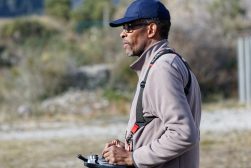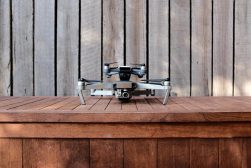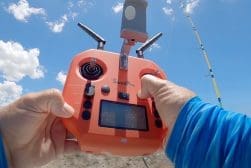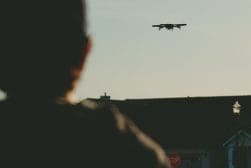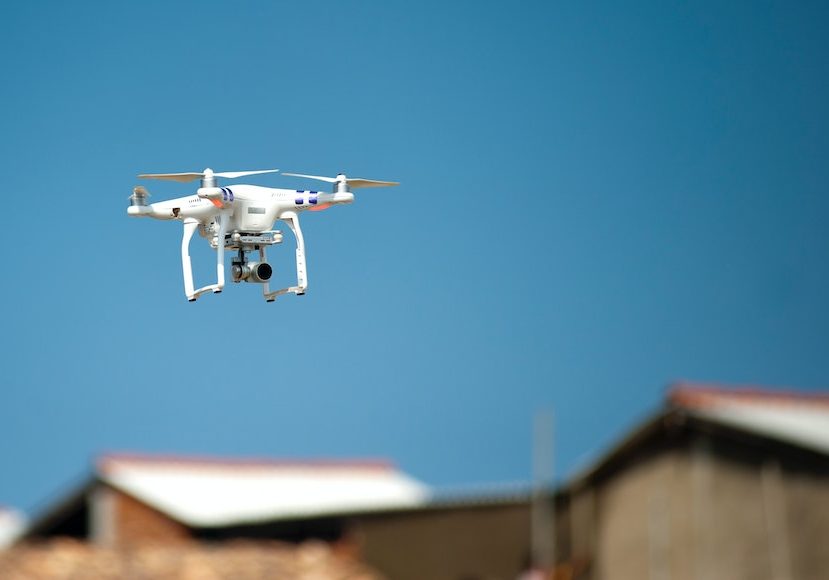
How Can I Prevent Drones Flying Over My House?
We all know the feeling that a drone flying over your house can bring. Anger, embarrassment and even fear. Here's what to do if there's a UAV in your airspace.
Camera Gear Guides | Drone Guides | By India Mantle | Last Updated: March 6, 2024
Are drones flying over your house or property?
Or maybe you’re worried about potential privacy concerns and wish to protect your property rights.
This article will help you understand drone laws and regulations, deal with “drone flying over my house” incidents, and promote responsible drone usage within your community.
It’s time to take action and safeguard your privacy from unwanted drone flights!
What to do When a Drone Flies Over Your House
- Understand FederalLlaw and Local Laws on drone usage and regulations to ensure safety, privacy, and responsible use.
- Take preventative measures to protect property from unwanted flights such as signage or barriers.
- Report incidents to uphold safety regulations & promote etiquette through education materials & STEM programs.
Understanding Drone Laws and Regulations
Knowing the drone laws and regulations in different countries helps homeowners be aware of their rights and take appropriate action against unwanted drone flights.
Laws regarding flying drones can vary significantly by country and are typically governed by federal, state, and local laws.
These laws are designed to protect the privacy and safety of individuals, as well as to ensure the responsible use of drones.
It’s essential to be cognizant of the laws and prioritize safety and privacy when operating a drone.
Let’s dive into the drone laws and regulations in the United States, the United Kingdom, Canada, and Australia to better understand the legal landscape surrounding drone flights over residential properties.
US Drone Commercial Laws regarding flying over residential property
In the United States, commercial drone operators must follow Federal Aviation Administration (FAA) regulations, which require them to obtain permission prior to flying over private property and maintain a safe distance from people and structures.
This helps ensure the safety of individuals and protects their privacy while drones are flying.
It is important to note that there are different legal requirements for operating a drone for commercial purposes and recreational purposes in the US.
For recreational drone usage, operators must adhere to all FAA guidelines, but there are no other restrictions on where or when they can fly their unmanned aircraft systems.
USA – California
Using drones can be controlled by Civil Code Section 1708.8. This law states that the invasion of privacy and trespassing by entering any private area from land or airspace without explicit permission to take photos or record videos is legally forbidden in California.
Recreational drone users should check individual state park laws before flying them. Research and public drones should obtain certain permissions before flying.
USA – Michigan
You can fly drones over private properties in Michigan. However, hovering over houses and taking photos or recording videos without permission is strictly forbidden.
USA – Texas
It’s legal to fly a drone in Texas, even if you fly it over private land. However, low-flying can be a safety hazard, so operators should ensure they maintain a safe height while operating their drones.
USA – Alabama
Drone operators in Alabama are allowed to fly them only over their personal properties or properties they have been granted permission to fly over. Commercial drone pilots are required to obtain specific permits and pay fees to be able to operate their commercial drones.
USA – Georgia
In Georgia, the drone law states that flying drones is legal as long as the operators comply with the FAA regulations. However, you should regularly check for airspace restrictions, which are regularly updated.
USA – Florida
Flying drones over private properties is legal in Florida. Yet, trespassing and nuisance are strictly forbidden, so someone can report you if you annoy them, whether you’re using drones for recreational or commercial purposes.
USA – Washington
Unless you’re flying a drone over your own private property or waterways, you’ll need a permit. This includes streets and sidewalks, which aren’t considered navigable airspace, so you might be unable to use it in residential areas.
UK Drone Commercial Laws regarding flying over residential property
In the United Kingdom, a drone operator can fly a drone over private property, but there are regulations in place regarding their proximity to properties.
A drone operator must maintain a distance of at least 150m from residential, recreational, commercial, and industrial sites.
Additionally, a drone pilot must comply with Civil Aviation Authority (CAA) regulations and avoid flying over densely populated areas.
These regulations aim to protect individuals’ privacy and ensure that drone operations do not pose any safety risks to the public.
Canadian Drone Commercial Laws regarding flying over residential property
In Canada, it is illegal to operate a drone over private property without the consent of the property owner.
Moreover, drone operations must take place below a maximum altitude of 400 feet above ground level or, if higher than 400 feet above ground level, remain within 400 feet of a structure.
Transport Canada mandates that all drone operators must register their drone, acquire a pilot certificate, and comply with all applicable regulations.
This helps protect the privacy of individuals and ensures the safe operation of drones in Canadian airspace.
Australian Drone Commercial Laws regarding flying over residential property
In Australia, it is not permissible to fly a drone over someone’s house or private property without the owner’s consent.
Additionally, drones must be flown during daylight hours, kept within visual range, and not flown higher than 120 meters above the ground.
Drone operators must comply with the regulations set by the Civil Aviation Safety Authority (CASA).
Adhering to these rules helps protect the privacy of individuals and ensures the safe operation of drones in Australian airspace.
Cuban Drone Laws
Drones are banned in Cuba and will be confiscated by the authorities at the airport.
Can You Fly a Drone Over Private Property?
Is it illegal to fly a drone over private property? Not exactly. You can fly a drone over private property in some locations as long as you follow the law.
According to the FAA or Federal Aviation Administration, you can fly drones over private properties without filming or photographing for privacy issues. Yet, in some states and locations, it might be illegal to do so.
Many hobbyists fly drones for several recreational purposes, like taking landscape and sunset photos from angles that would otherwise be impossible to achieve. People can also engage in drone games, races, and tricks.
So, you might find a drone hovering over your house. It might also be taking photos or recording the surroundings.
In addition to these recreational activities, some people use drones for other purposes, like fast delivery services.
Flying a drone over personal property is legal while considering these factors.
- As long as you follow the FAA rules regarding Unmanned Aircraft Systems, flying a drone over someone else’s property would be legal, as long as you aren’t violating their privacy or harassing them.
- Drone operators must maintain a visual line of sight, so you can’t operate your drone where you can’t see it. This limits where you can fly it.
- You should maintain a maximum height of 400 feet and a speed of 100 miles per hour to fly drones over private properties in most areas.
- In addition to the FAA regulations, some state laws limit the use of drones in private communities.
- You aren’t allowed to take photos or record videos of someone else’s property without the owner’s permission. Otherwise, they can report you to the FAA for breaking the law.
- Excessive hovering over private properties to the point of causing a nuisance is forbidden, even if you’re allowed to fly drones in your area.
- The drone law doesn’t apply in some cases, as you can’t fly drones over government-secured spaces, airports, stadiums, and sporting events. So, you should check public property no-fly zones in your state.
Privacy Concerns and Flying Drones

Credit: Jess Loiterton
The potential privacy implications of drones include the possibility of surveillance, an increase in noise levels, and a breach of personal space.
Drones are capable of being utilized for surveillance purposes, which can lead to issues such as harassment, stalking, invasion of privacy, voyeurism, and unlawful surveillance.
If a drone is consistently present at treetop level above your residence, it is reasonable to assume that it is engaging in surveillance.
In such cases, understanding your rights and the legal options available to you is crucial to protect your privacy and deal with any potential drone spying incidents.
What to Do When a Drone Flies Over Your Property
When a drone flies over your property, it’s essential to know the appropriate steps to take.
First, document the drone’s registration number and any identifying marks, and take photos if possible.
If you believe the drone is infringing on your privacy, consider contacting local law enforcement.
They can help determine if any laws have been broken and take the necessary steps to address the situation.
In some cases, communicating with the drone owner may help resolve the issue amicably.
Establishing boundaries and discussing your concerns with the drone operator, who is also the drone pilot, may lead to a better understanding of each other’s rights and promote more responsible drone usage.
Preventative Measures for Drone Flying

Credit: PxFuel
There are several preventative measures that homeowners can take to protect their property from unwanted drone flights.
Installing signage such as “No Drone Zone,” “No Trespassing,” or “No Unauthorized Drone Flying” can help discourage drone operators from flying over your property.
Additionally, constructing physical barriers like nets, laser pointers, anti-drone drones, and anti-drone jammers can help inhibit drone flying.
Advocating for stricter drone regulations in your local area is another effective measure for preventing drones from flying over your property.
By lobbying for more stringent rules and restrictions, you can help create a safer and more private environment for yourself and your neighbours.
What are the best drone accessories?
How to Deal with a Drone Spying
If you suspect that a drone is spying on you or there’s a drone hovering suspiciously, it is essential to gather evidence of the incident and familiarize yourself with privacy regulations.
Understanding the laws surrounding drone spying can help you take appropriate legal action if necessary.
When faced with drone spying incidents, it is advised to contact local law enforcement rather than trying to handle the matter independently.
Law enforcement agencies can help enforce existing regulations and deter irresponsible drone usage, ultimately protecting your privacy and property rights.
Communicating with Drone Pilots
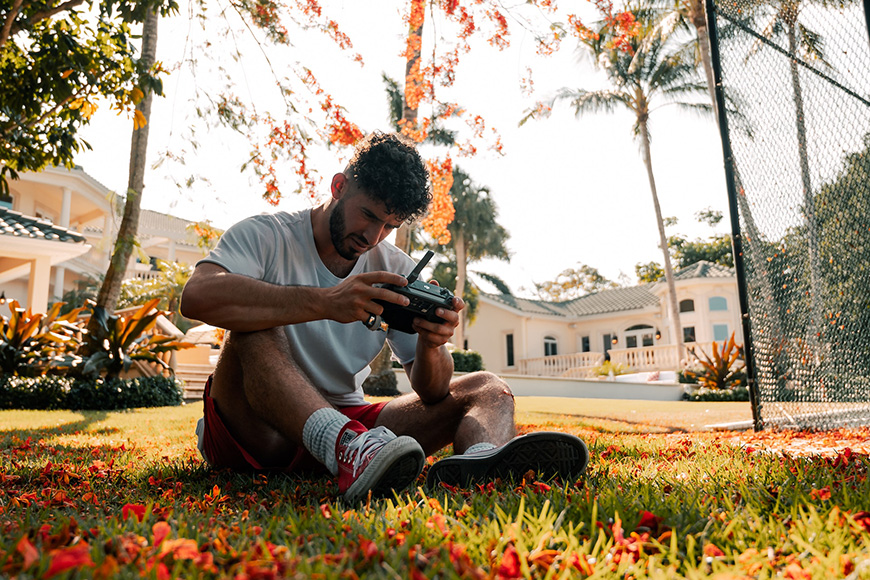
Credit: Colin Illoyd
Open communication with drone pilots can help resolve issues amicably and establish boundaries for responsible the use of recreational drones.
By discussing your concerns with the pilot, you may be able to find a mutually agreeable solution and set appropriate limits for those who fly drones near your property.
Promoting responsible drone usage and fostering a respectful approach to drone flying can also be achieved through community engagement and education efforts.
Educating your community on drone etiquette and the importance of respecting the privacy of others can encourage a more considerate approach to drone flying and ultimately benefit everyone involved.
Navigating State and Local Drone Laws
Navigating state, local, and federal laws regarding drone usage requires researching specific regulations, understanding your rights, and staying updated on any changes in the legal landscape.
States and local governments are generally able to enforce laws that prohibit criminal acts, such as trespass, privacy invasion, harassment, or criminal mischief, or that regulate zoning and land use.
To stay informed about drone flight regulations, you can access relevant information on the Federal Aviation Administration (FAA) website or the B4UFLY app (Android) (iOS)
It is also advisable to consult your state’s website to gain insight into local laws pertaining to drones.
By being knowledgeable about the laws and regulations set forth by the state and local governing body in your area of operation, you can protect your property rights and privacy more effectively.
Protecting Your Property Rights
Protecting your property rights involves understanding airspace ownership and taking legal action against trespassing drones if necessary.
The airspace above a house is owned by the Federal Aviation Administration (FAA), and any drone operation that infringes on your property rights can be reported to the FAA for legal action.
Advocating for clearer drone regulations can also help protect your property rights.
By reaching out to your local government representatives and expressing your views on the matter, you can influence the development of more comprehensive and effective drone regulations that safeguard your privacy and property rights.
Reporting Incidents of Flying Drones
Reporting drone incidents to local law enforcement or aviation agencies is crucial for enforcing existing regulations and deterring irresponsible drone usage.
If you observe a drone operation that appears hazardous or is being utilized for criminal activity, it is highly recommended to alert local law enforcement without delay.
If the report involves a drone not adhering to FAA rules or regulations while flying within the National Airspace System, you can contact your local Flight Standards District Office for assistance.
By reporting drone incidents, you contribute to creating a safer and more private environment for your community.
Educating Your Community on Drone Etiquette
Educating your community on drone etiquette is essential for promoting responsible drone usage, raising awareness of privacy concerns, and fostering a respectful approach to drone flying.
Drone etiquette includes respecting the privacy of others, avoiding flying over people or property, and adhering to all applicable laws and regulations.
Methods of educating the community on drone etiquette include creating and distributing informational flyers or brochures, as well as incorporating drones into STEM education.
By raising awareness and educating others on responsible drone practices, you can help create a safer and more respectful environment for drone flying in your community.
Illegal Ways to Stop Drones From Flying Over Your Property
There are legal and safe ways to stop people from flying drones over your land and household.
However, attempting to stop a drone from flying by yourself can get you in trouble.
It’s crucial to consult a lawyer if you don’t know the rules and regulations that regulate flying and stopping drones. Here are some illegal ways to disable drones.
- Using nets to catch and stop private recreational and commercial drones is illegal. Although the Department of Defense can disable flying drones this way, civilians will be penalized if they use these nets.
- Using a high-intensity laser to damage and stop a drone is illegal. The drone’s pilot can file a complaint against you, and if they get hurt in the process, you’ll face a legal offense.
- You can’t interfere with the operational signals of drones. The US Special Forces and several authorized individuals have permission to disable drones using signal jamming, but you can’t do this on your own.
- Signal spoofing, which interferes with the drone’s settings, is also forbidden. This method can prompt the drone to change its direction while it’s flying, and it’s usually used by the military.
- In some countries, governments have attempted to train birds of prey to hunt and stop drones, but you shouldn’t try this at home. This method can result in the bird’s injury, holding you legally liable and subject to criminal penalties.
- Can you shoot down a drone over your property? The answer is No. Attempting to shoot a drone with a gun is incredibly dangerous. The bullet might accidentally hurt someone, and you’ll be liable for any damage.
Final Words
In conclusion, understanding drone laws and regulations, dealing with drone spying incidents, and promoting responsible drone usage are crucial steps towards protecting your property rights and privacy from unwanted drone flights.
By taking appropriate action, communicating with drone pilots, and educating your community on drone etiquette, you can contribute to creating a safer and more private environment for yourself and your neighbors.
It’s time to take control of your airspace and protect your privacy from intrusive drones.
Drones Flying Over My House: FAQs
Can you do anything about a drone flying around your house?
You can take action against drones flying around your house.
Contact local law enforcement and report the drone if it is on your property without your consent.
If possible, try to identify the drone’s owner.
Taking steps to protect your privacy is an important part of keeping yourself safe.
What to do if a drone is spying on you?
If you believe that a drone is spying on you, take immediate action.
Contact your local police department or the Federal Aviation Administration (FAA) for assistance.
The appropriate authorities will be able to evaluate the situation and determine the best course of action.
Be sure to remain alert and stay safe in the meantime.
What are the privacy implications of drones?
Drones have the potential to significantly erode privacy, with possible implications for both personal and national security.
To ensure respect for privacy and safety, it is important to set effective regulations and enforce existing laws.
Regulation should be tailored to the specific context of drone use, taking into account the potential risks and benefits of the technology.
It should also be flexible enough to adapt to changing circumstances and technological advances.
How can I protect my property rights from trespassing drones?
To protect your property rights from trespassing drones, it is essential to educate yourself on airspace ownership laws, consider legal action in the case of trespass, and support laws that create clearer regulations for drone operators.
Airspace ownership laws vary from state to state, so it is important to research the laws in your area.
In some cases, you may be able to take legal action against a drone operator who has trespassed on your property.
Additionally, you can support laws that create clearer regulations for drones.
How can I educate my community on responsible drone usage?
As a member of the community, you can help educate your neighbors on responsible drone usage through various strategies.
From creating and distributing flyers with safety tips, to incorporating drones into STEM education and encouraging proper etiquette, you can help ensure that drones are used safely and responsibly.
As the Content Manager of Shotkit, India Mantle brings with her a lifelong love for photography that she developed during her childhood, watching her father document their family moments with his Nikon EM. In her free time, you find her enjoying the awe-inspiring natural beauty of her home, Northern Rivers, Australia.





